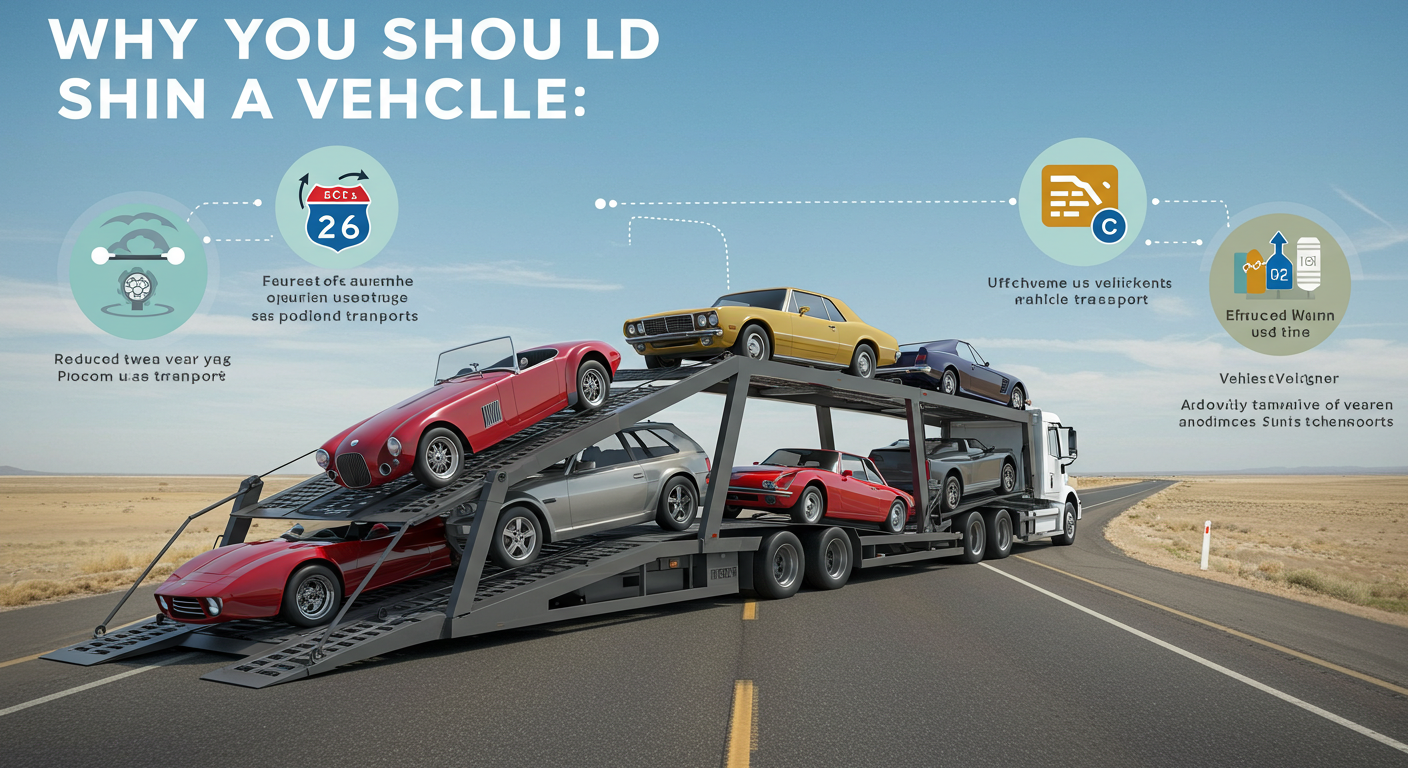When it comes to moving your vehicle, thoughts of long drives, road fatigue, and potential breakdowns might loom large in your mind. But what if I told you there’s a better way? Shipping your vehicle not only eases the burden of travel but also protects your investment and saves you time. Imagine stepping off a plane in your new city, with your car waiting for you instead of sitting in traffic for hours. That’s the magic of vehicle transport! In this article, we’ll explore the many benefits of shipping a car, from convenience to safety, and help you decide if it’s the right choice for your next move.
Shipping a vehicle can be a practical choice when relocating to another state or country, as it saves you the hassle of long-distance driving and potential wear-and-tear on your car. Additionally, individuals who have specific vehicles they wish to maintain, such as classic cars or campervans for extended travel, find that shipping is often more cost-effective and convenient compared to renting or purchasing new vehicles in their destination.

Top Reasons for Shipping a Vehicle
One significant reason behind the decision to ship a vehicle is relocation. When people move across long distances, whether it’s from one state to another or even internationally, handling the logistics of transporting their car can prove invaluable. Imagine juggling packing your belongings, arranging housing, and taking care of various other responsibilities; having your vehicle shipped can alleviate some of that overwhelming stress. Instead of driving the vehicle yourself over hundreds—or even thousands—of miles, you have the option to have it transported safely while you focus on settling into your new environment.
For instance, if you’re relocating for a job opportunity in another city, think about how much time you might save by shipping your vehicle directly to your destination instead of embarking on a tiring road trip. With the average cost savings of shipping reaching around $0.50 to $1.00 per mile, the financial implications become attractive as well as practical.
Another critical aspect where vehicle shipping shines is in the automotive sales market.
Buyers and sellers actively engaging in online platforms like eBay Motors can also reap the benefits of shipping. When selling a car with potential buyers located out of state, logistics become essential. The seller may attract more interest by opening up options for buyers beyond their geographic boundaries, yet arranging transportation can be daunting. Shipping ensures that the vehicle can be delivered securely and efficiently to its new owner—a definite plus in achieving timely and smooth transactions.
Consider this: A buyer willing to purchase a classic sports car might live across the country but is ready to pay a premium for it; knowing they can efficiently ship it directly to their home gives them good reason to proceed with the sale rather than hunting locally for comparable vehicles.
Moving on, let’s explore how professionals can uniquely benefit from vehicle transport services.
Working professionals may find shipping their vehicles particularly useful when assigned to project-based work or temporary placements in different regions. Imagine needing your reliable car to commute daily while working away from home—but instead of dealing with wear-and-tear from long-distance driving, you can simply ship it ahead to arrive right at your accommodation, allowing you to start each day efficiently. Not only does this save significant time by cutting down travel distance from initial locations, but it also minimizes potential risks associated with long road trips, such as accidents or mechanical breakdowns.
As we consider these advantages, it’s clear that convenience plays a vital role in transporting vehicles smoothly and effectively. Let’s shift our attention now to how these services take away the hassle and enhance the overall experience.
Convenience and Hassle-Free Transport
Imagine skipping the grueling hours spent on the road, fueled only by gas station snacks and countless boring radio songs. Instead of dealing with traffic jams or fatigue from a long haul, you can have your car shipped right to your destination. This means while your vehicle is being transported, you’re free to focus on settling into your new home, spending quality time with family, or perhaps even enjoying some much-needed rest and relaxation.
This convenience becomes even more crucial when considering how stressful moving can be. There are endless to-do lists—setting up utilities, packing boxes, finding schools—so why add the strain of a long drive? Many people often overlook this, but having a professional handle the logistics of your vehicle transport allows you to channel your energies where they’re needed most. A door-to-door service rearranges the stress associated with moving by eliminating unnecessary travel to pick up or deliver your vehicle.
Reducing Wear and Tear
When you opt for shipping, you’re not just making life easier; you’re also protecting your investment. Long drives can be harsh on a vehicle’s mechanical components. Every mile adds wear to the engine, tires, and brakes. By shipping your vehicle instead of driving it, you’re effectively avoiding potential issues that could arise from an extensive road trip, such as engine problems or tire blowouts.
As one user shared on Reddit, “I moved from California to New York, and shipping my car saved me from putting 3,000 extra miles on it.” This sentiment is common among those who’ve experienced shipping firsthand; many owners share similar stories where their vehicles emerged unscathed while maintaining lower mileage.
With these key benefits in mind, the question of ensuring protection during transport becomes paramount. Understanding how to keep your vehicle safe throughout its journey paves the way for a worry-free experience.
Safety and Security of Your Vehicle

Opting for vehicle shipping gives you peace of mind knowing that your car is in capable hands. This not only involves the physical transportation but also encompasses the various protective measures in place during transit. One of the standout features of some shipping services is the enclosed transport option. Enclosed containers significantly reduce exposure to weather conditions and road debris, keeping your vehicle safer than if it were exposed to the elements.
The benefits don’t stop there; these enclosed transports often mitigate risk. Industry reports indicate that open transport vehicles encounter about 1.5% more incidents of damage than their enclosed counterparts. With this in mind, choosing enclosed transport can be a smart decision for maintaining your vehicle’s condition throughout its journey.
Professional Handling
When entrusting your car to a shipping service, it’s imperative to select one that employs experienced drivers. Reputable shipping companies understand the complexities involved in transporting vehicles, which is why their personnel undergo training focused on safety and effective navigation of transport challenges. Each driver is skilled at ensuring cars are securely loaded, properly balanced, and safely transported.
According to a recent survey by Car Shipping Quotes, a remarkable 85% of shipped vehicles arrive without any damages thanks to this professional handling. Such high rates of success not only highlight the competence of these professionals but also underscore the importance of relying on established companies who prioritize vehicle safety.
While acknowledging the safety aspects and professional handling is crucial, it’s equally important to consider the practical elements, including expenses related to vehicle shipping.
Cost Considerations in Vehicle Shipping
When you decide to ship a vehicle, one of the first things that come to mind is how much it’s going to cost. It’s essential to grasp not only the overall expense but also the various factors that can affect these costs. For instance, if you’re shipping a vehicle across the country, you might be looking at an average price of around $1,245 based on a median distance of approximately 971 miles; however, this rate fluctuates depending on a few key details.
Pricing Factors
| Factor | Impact on Cost |
| Distance | Longer distances decrease cost per mile |
| Vehicle Size | Larger vehicles incur higher costs |
| Shipping Method | Enclosed transport costs more |
| Seasonality | Prices may increase in winter and peak seasons |
The distance plays a significant role in determining your final bill. Generally speaking, longer shipments tend to have lower prices per mile. This means that while a short trip could cost around $0.80 per mile, transporting that same vehicle over a 2,500 to 3,000-mile journey could drop the cost down to as low as $0.35 per mile. Hence, it can actually work out cheaper in some cases to move your car across multiple states rather than just across town.
But that’s not all; the type and size of your vehicle also come into play when calculating rates.
If you’re driving an oversized SUV or a heavy-duty truck, those bigger dimensions will affect your shipping fees. Transporting larger vehicles typically incurs higher costs due to their specialized transport needs. If delivery drivers must allocate extra space and weight allocation, naturally those costs pass right back to you.
Timing can also be critical when it comes to pricing.
During certain times of the year, such as summer—when many individuals move for work or school—the demand for auto transport skyrockets. This surge can lead to increasing shipping rates as more customers seek services simultaneously. On the flip side, off-peak seasons like fall often present competitive pricing as demand decreases after the summer rush. It’s worth keeping in mind that if you’re flexible with your schedule, planning a move during these less popular times might save you money.
Knowing the right shipping service becomes key to optimizing costs.
Understanding these varied cost considerations can help demystify the vehicle shipping process and assist you in budgeting accurately for your upcoming transport needs. By being aware of the distance implications, vehicle size variations, seasonal rate fluctuations, and transport methods available—like enclosed versus open transport—you can make informed decisions that align with both your budget and your service expectations.
With this foundation laid out on financial aspects, let’s shift focus toward how to best select a suitable shipping provider for your needs.
Choosing the Right Shipping Service
Not all shipping services are created equal, so it’s crucial to select one that suits your needs. When deciding on a transport company, thorough research is essential. You want to know whom you’re entrusting with your vehicle and its safety throughout the journey. Start by researching various companies but don’t just scrape the surface—explore customer reviews and testimonials. Websites like Transport Reviews provide invaluable resources, offering genuine feedback from users who have firsthand experience with these services.
Research and Reviews
The insights you gather can guide you to trustworthy providers. Pay attention to consistent themes in reviews. For instance, a company receiving repeated compliments for promptness may be an excellent option if time is your priority. On the other hand, frequent complaints regarding damage during transport signify a red flag—one you should heed closely.
Aside from websites dedicated to reviews, consider asking friends or family for recommendations based on their experiences. Personal testimonials can reveal much about a company’s reliability and customer service, helping you narrow down your choices even further.
Insurance Coverage
Ensuring that the shipping service provides comprehensive insurance coverage is vital. It offers peace of mind and acts as a safeguard against any potential mishaps along the way.
Without adequate insurance coverage, you might find yourself paying out of pocket for repairs if damages occur during transportation. It’s essential to clarify details: What does the policy cover? Are there limitations? A reputable company will be transparent about these aspects. Notable companies like A1 Auto Transport are recognized for competitive pricing alongside extensive insurance policies and exceptional customer support, making them stand out among competitors.
While exploring the benefits of professional services, it’s also important to examine alternatives that could offer flexibility and control in transportation decisions.
DIY vs Professional Vehicle Transport

When faced with the question of how to transport your vehicle, you might instinctively lean toward handling it yourself. After all, driving your own car over long distances or renting a trailer sounds cost-effective.
Certainly, there is a sense of adventure in hitting the open road, but this path comes with its own challenges. Driving your vehicle can lead to exhaustion, especially if you’re traversing vast stretches across states or countries. Picture a journey that spans over 1,000 miles—those 20 to 30 hours of driving can feel endless after just a few. Moreover, planning logistics around fuel stops, bathroom breaks, and meals can complicate what might initially seem like a straightforward option.
In contrast, utilizing a professional vehicle transport service alleviates much of the labor involved in moving a vehicle. With options like open or enclosed transport available, you are presented with flexibility tailored to your needs.
Though these services come with their costs—averaging between $600 to $1,200 for transportation over 1,000 miles—the fees include far more than merely ferrying your car from point A to point B. They encapsulate peace of mind, liability coverage up to $1 million during transit, and often door-to-door service that saves you the hassle of navigating unfamiliar roads.
Choosing a professional over DIY often leads to debates among vehicle owners. While some argue about the extravagance of hiring external help, many find that those added costs yield significant benefits—mainly convenience and assurance of protection for their vehicles.
The sentiment echoed features shared experiences on forums where users rave about saving not just funds but also mental energy by opting for professionals. As one Car Talk forum user succinctly stated: “I tried driving my car cross-country once but next time, I chose shipping. The amount of stress it saved me was worth every dollar.”
Ultimately, whether you gravitate toward the DIY approach or hire professional services depends largely on your circumstances and preferences.
Consider the costs in terms of both money and time when making this pivotal choice; sometimes convenience isn’t just a luxury—it’s an investment in sanity.
In conclusion, evaluating your vehicle transport options thoughtfully can lead to significant savings not only in money but also in time and stress. Your chosen method should align with your needs to ensure a smooth transition for you and your vehicle.















